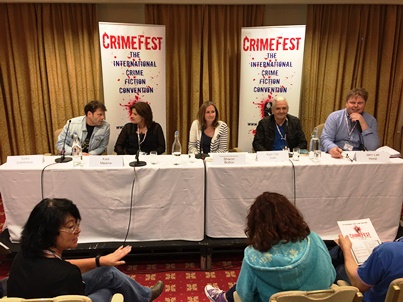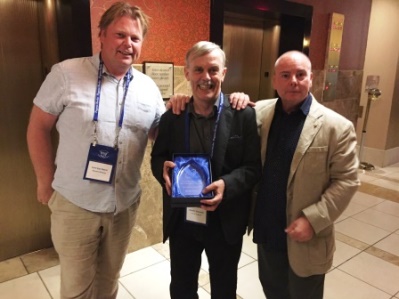It is thirteen years now since Norwegian author JØRN LIER HORST burst onto the crime fiction scene with Key Witness, which was based on a true murder story. The former
Senior Investigating Officer has since published a series featuring his
detective, William Wisting. Along the way, Jørn has been awarded a multitude of
prizes including The Martin Beck Award, The Glass Key and the Petrona Award. It
wasn’t until 2011 that Dregs, the
sixth in the series, was translated into English, and luckily enough for us was
published in the UK by Sandstone Press.

What makes a good
crime novel is difficult to pinpoint exactly. It's a bit like defining love, or
trying to explain a colour. One element is essential though: it must contain a secret.
The contract I make with my readers is that I will reveal that secret.
Nothing provokes our
curiosity more than secrets, and we all have them. They may be large or small, but we all have them. Their recognition,
and sometimes confession, is an important psychological feature of a healthy
inner life.
Power is often linked to knowledge that is
hidden. Federations, alliances, trade and international relations are all permeated
with it. Economic and political governance depends on it. All states have their
secret services, and companies need confidentiality to gain competitive
advantage. There is always a hidden narrative playing out behind the scenes.
Secrets are a means of empowerment, and an
important dynamic in private and social, as well as political games. At the
level of international diplomacy, revelations from Wikileaks, Snowden and The Panama Papers may have been in some
ways beneficial, although opinions differ. A lot has been, and continues to be,
at stake for many of the actors, state as well as private, which not only
demonstrates the power of secrets but also the fascination they hold.
During my childhood, I
heard of an old barn where, some time before World War II, a car had been
pushed inside and covered with a tarpaulin. No one had been inside since. There
is something about old barns that triggers curiosity. You never know what is
behind those dusty windows with their cobwebs, and doors that have been closed
for decades. My young friends and I often embarked on expeditions to find this barn,
anxious to uncover the secret.
We never found it, but
police Inspector William Wisting was luckier, and inside was a rare veteran car
full of bullet holes. Not only that but the barn doors were locked both outside
and in. When It Grows Dark is,
therefore, a classic locked room mystery.
My new novel is the eleventh
about William Wisting. Through his previous history, he has evolved and changed
with the society he lives in, watching from the inside how crime has become
coarser and more professional, and how we have all become less secure. As the
world around him has become gradually darker, Wisting has become increasingly
disillusioned. I have, in many ways, written him into a special darkness of his
own.
My ambition for When It Grows Dark was to explore what William
Wisting was like before the organized and brutal crime of today appeared, in the
early 80's, when he was a newly graduated star of the police college, his wife
was still alive and their daughter in a stroller. What I found, in the course
of writing, was that some aspects of Wisting were the same then as now.
He was, and remains, a
man of patience and understanding who can penetrate even the deepest of secrets.
And now for a small treat - some photos of what Jørn gets up to when not writing!

CrimeFest 2017 Panel: Risking It All: How Far Would Your Characters Go?
Torkil
Damhaug, Kate Medina, Sharon Bolton, Kjell Ola Dahl and Jørn Lier Horst

Jørn with CWA Chairman Martin Edwards and Mike Stotter at Boucherchon 2016 New Orleans

This will put you off your tea! Jørn with Ali Karim
Photos © Ali Karim